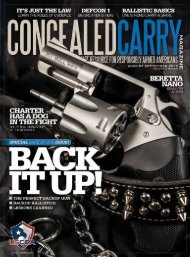Download This Issue - US Concealed Carry
Download This Issue - US Concealed Carry
Download This Issue - US Concealed Carry
You also want an ePaper? Increase the reach of your titles
YUMPU automatically turns print PDFs into web optimized ePapers that Google loves.
IT DOESN’T HAVE TO MAKE SENSE ... IT’S J<strong>US</strong>T THE LAW<br />
The state<br />
must adopt<br />
the citizen’s<br />
violence<br />
through an<br />
informal<br />
or formal<br />
ceremony.<br />
©iSTOCKPHOTO - MAICA<br />
Ceremonies<br />
[ BY K.L. JAMISON, ESQ. ]<br />
The state has a monopoly on violence.<br />
<strong>This</strong> is a concept dating from the<br />
concept of the “King’s Peace” established<br />
a thousand years ago.<br />
However, a generous state shares this<br />
monopoly with its citizens under certain<br />
circumstances. The state must adopt the<br />
citizen’s violence through an informal or<br />
formal ceremony. The most informal is<br />
the police officer’s report. If the officer<br />
stresses evidence favorable to the citizen<br />
then ceremonies held at higher levels<br />
will be constrained in the harm that they<br />
can do. 1<br />
Even if the officer does not arrest<br />
the citizen, the matter will be sent to<br />
the prosecutor for charges. The county<br />
prosecutor (in some states called a district<br />
attorney and in the federal system<br />
the U.S. Attorney) has absolute power<br />
to decline to prosecute. Presented with<br />
a good reason not to prosecute he will<br />
maintain his conviction record by not<br />
filing charges. A “good reason” is an obvious<br />
defense or a difficult prosecution.<br />
These informal ceremonies seldom end<br />
the matter, except in the most obvious<br />
cases (and often not then). The prosecutor<br />
will often share responsibility by<br />
sending the matter to one of the formal<br />
ceremonies. The formal ceremonies include<br />
the Coroner’s Jury, Grand Jury and<br />
Preliminary Hearing.<br />
The coroner is usually an elected<br />
county official in charge of investigating<br />
suspicious deaths. He (or she) is a “conservator<br />
of the peace” in his county, and<br />
traditionally considered to be a law enforcement<br />
officer. There are no extraordinary<br />
requirements for the position.<br />
The coroner is empowered to empanel<br />
a jury for a community verdict on the<br />
cause of death. He may summon witnesses,<br />
and employ a medical examiner<br />
to testify as to the cause of death. The<br />
jury may return a verdict of self-defense,<br />
accident or felony. The prosecutor may<br />
accept this verdict as the community’s<br />
verdict adopting the citizen’s violence.<br />
However, he is not required to do so.<br />
Once charged, bail will be set.<br />
Reasonable bail is a constitutional right,<br />
used to guarantee appearance at court,<br />
and cannot be used simply to keep a<br />
defendant in jail. In practice it is used<br />
to keep persons believed to be violent in<br />
jail. Without coming before a judge, a defendant<br />
can be released only by paying<br />
the bond, or arrangement with a bonding<br />
company. For long-term residents<br />
the bonding company may dispense<br />
with the need for a surety. They are a<br />
business; everything is negotiable.<br />
Shortly after arrest the client must be<br />
taken before a judge for arraignment.<br />
<strong>This</strong> is a formality in which the charges<br />
are read to the defendant on the theory<br />
that the guest of honor will then know<br />
what the party is about. Conversations<br />
with persons who have been arraigned<br />
indicate that it goes straight over their<br />
heads, lost in legal jargon. A copy of the<br />
charges (the paper the judge reads from)<br />
should be requested. If an attorney is<br />
present for the defendant, he will waive<br />
reading of the charges and be handed a<br />
copy. Bail will be addressed perfunctorily.<br />
Having an attorney in advance will<br />
be an advantage in addressing this question.<br />
The defendant may be released on<br />
recognizance (ROR) or on “Ten percent<br />
60<br />
<strong>US</strong>CONCEALEDCARRY.COM n CONCEALED CARRY MAGAZINE n MAY/JUNE 2011
















